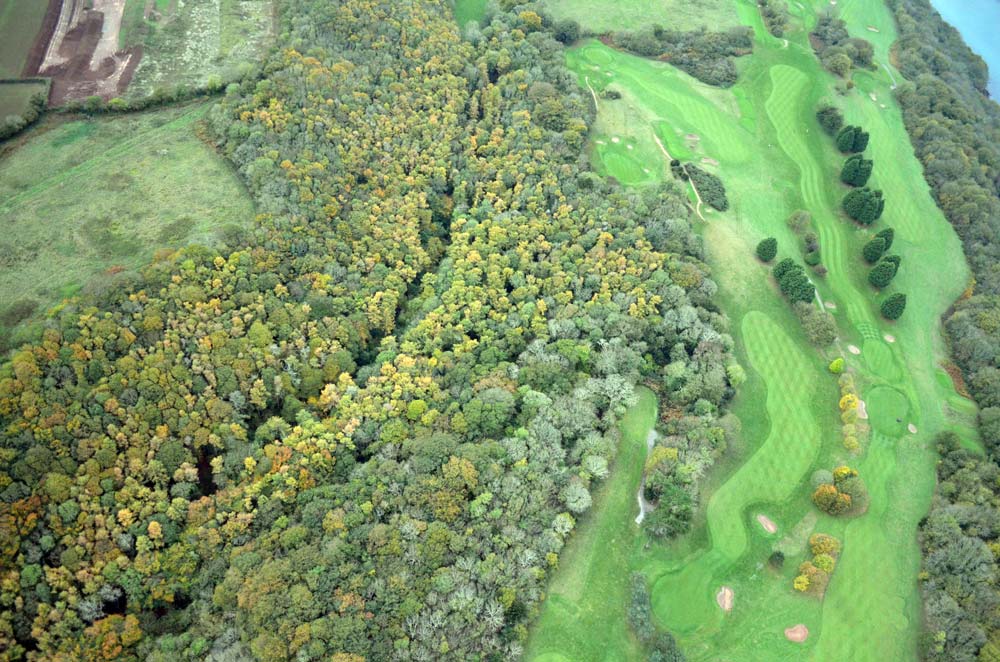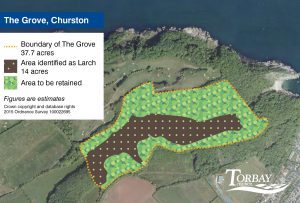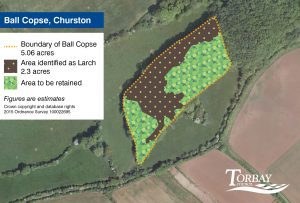A large number of diseased trees will be felled from two woodlands in Churston – the Grove and Ball Copse, over the next 12 weeks.
The Forestry Commission confirmed the disease Phytophthora Ramorum (P.ramorum) in a number of trees following ground inspections and laboratory sample testing. P.ramorum is a fungus-like microorganism which causes extensive damage and can kill a wide range of trees and other plants.
The Grove and Ball Copse are owned by Torbay Council and managed by Torbay Coast & Countryside Trust. The Forestry Commission has served Statutory Plant Health Notices on the Trust and Torbay Council requiring that all the Larch and those Sweet Chestnut trees showing signs of disease be felled before 31 March 2017. To accelerate matters, the Trust has agreed to give Torbay Council a licence, to allow the council to enter the woodlands and manage the necessary operations.
The environmental and economic impacts can be serious if P.ramorum levels are allowed to build up in the environment, so early felling is essential to minimise the risk of the disease spreading to neighbouring trees and other plants.
Councillor Robert Excell, Executive Lead for Community Services, said: “Following the statutory notice issued by the Forestry Commission we instructed Hi-Line SW Ltd to carry out the felling works required at Ball Copse and The Grove woodlands in Churston. We continue to be very committed to ensuring the maintenance and protection of trees across Torbay which is why this felling work is necessary. Unfortunately it appears that over 1,000 Larch and Sweet Chestnut trees have been infected by P Ramorum and it is essential that we carry out these works to limit the spread of this disease to other healthy trees and plants.
“Due to large machinery being needed to carry out the work, and the large number of trees needing to be extracted, parts of the woodlands will be restricted to members of the public. This is to ensure the safety of everyone who uses the woods and it will be well signposted to show which tracks are shut.”
Damian Offer, Director of Torbay Coast & Countryside Trust said “The Trust has sought to work positively with all our partners and neighbouring land owners to tackle this problem since the Forestry Commission Notice was originally served some years ago. We are pleased that prompt action is being taken now that matters which hitherto prevented the Trust taking action to remove the infected trees have finally been resolved. While the loss of a significant number of trees is always regrettable, removal of the Larch and Sweet Chestnut does offer a great opportunity to facilitate the establishment of more appropriate native broadleaved woodland within The Grove and Ball Copse, which will offer improved habitat for wildlife.’
Mick Biddle, South West England Tree Health Officer for the Forestry Commission, said: “We are committed to minimising the spread and impact of P.ramorum disease across the country, and working with Torbay Council to protect trees and other plants in the borough. The actions which the council is taking are in line with the national P.ramorum disease management strategy, which is based on the scientific advice of the Government’s Chief Plant Health Officer. The strategy’s emphasis on early destruction of infected and likely infected plants before they can spread the disease further has helped to significantly reduce the rate of new infection in recent years.”
In preparation for these works, the council instructed HI-Line Contractors SW Ltd to create a clear access path for machinery and to safely remove logs. This path has been created on private land in agreement with the private land owner and tenant. As part of this work there are temporary parking restrictions along a section of Bascombe Road, near America Lane.
For more information about these works please visit: www.torbay.gov.uk/woodlands.
In line with the P.ramorum strategy, the Forestry Commission urge the public, tree owners and tree professionals to remain vigilant and report suspected sightings with the Forestry Commission’s Tree Alert on-line disease reporting tool at www.forestry.gov.uk/treealert.
For more information about the disease, including symptoms and the management programme, visit: www.forestry.gov.uk/pramorum .
You can join us on our social media pages, follow us on Facebook or Twitter and keep up to date with whats going on in South Devon. Got a news story, blog or press release that you’d like to share? Contact us
































